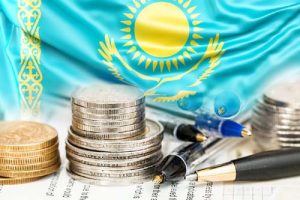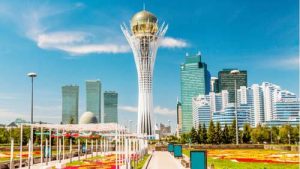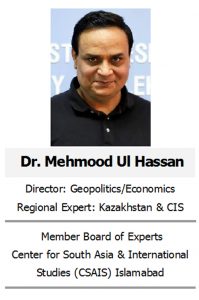Most recently, unfortunately, the Republic of Kazakhstan experienced a sponsored unrest which caused political chaos, economic instability and social disharmony. Thanks God, the government of Kazakhstan remained strong and largely stable and showed utmost resilience against all odds during these difficult times. Although worse crisis is over but crisis management capacity building has been somehow undermined due to many complex and complicated reasons which needs to be ratified as soon as possible.
Now, Kazakhstan’s President Kassym-Jomart Tokayev has been voted chairman of the governing party. However, he termed this as a temporary affair, citing the need for an “equidistant status of the head of state. He suggested further politicization and democratization in the country.
He stressed that there should be several strong parties in parliament capable of developing political leaders. But sudden switching from presidential democracy to parliamentary system may not be optimal choice.
President suggested various judicial reforms and noted that t he status of the Supreme Judicial Council (SJC) should be further strengthened. Moreover, Kazakhstan’s law enforcement department will also be substantially modernised as part of future reforms.
he status of the Supreme Judicial Council (SJC) should be further strengthened. Moreover, Kazakhstan’s law enforcement department will also be substantially modernised as part of future reforms.
President Kassym-Jomart Tokayev called on business leaders to work with the government on building a new economic policy during the meeting on January 21.
New reforms aim to become the basis of a new Kazakhstan. Fair competition, equal economic rights, predictability of state policy, tax transparency and social responsibility has now become the principal elements of the new economic policy.
Unfortunately, in Kazakhstan, 0.001 percent of the population controls half the nation’s wealth of the economy due to which “de-monopolization” of macro-economy and activation of fund, “For the People of Kazakhstan must be implemented as soon as possible. Therefore, fair competition is the need of the hour and therefore artificially created monopolies must be abolished immediately. Moreover, the President has instructed on the creation of the Council of Domestic Entrepreneurs (CDEs).
President Tokayev noted that he would continue the policy of political transformation and modernization with the transition to a market, socially-oriented and diversified economy.
In this connection, immunity of private property and transparency of court proceedings will be guaranteed. The investment climate has badly damaged due to recent political instability. However, the government has now offered sovereign guarantee to all the foreign investors. The President also called on business people “to reinvest funds in the country.”
To regain the confidence of local and international investors a new tax policy is essential as well as reforms in the procurement system. Development of private sector is also vital for liberalized economy. There are about 6,500 organizations which need to be further increased. The participation of the state in entrepreneurial activity should be reduced.
Furthermore, reduction of administrative barriers will definitely further enhance spirits of good governance. In this connection, the economic investigation service, the anti-corruption service, and national security should be clubbed. The development of the Small and Medium-sized businesses is the need of the hour. Ideal and befitting proposition between public and private sector would open new windows of cooperation, stability, sustainability and prosperity in the days to come.
During the recent difficult times, the system was apparently entangled and dis-functional somehow between old guarantor-ship and new enlightenment and old King and new Knight. Nevertheless, Kazakhstan President Tokayev took various essential diversified but integrated measures to maintain peace and stability in the country.
Let me clarify that it was not a new wave of “Color Revolution” of Central Asia because of western propaganda of so-called of denial of democracy and human rights which is totally misquoted, misjudged and misinterpreted. The Republic of Kazakhstan is a democratic country although different and unique but as good as any modern western country.
Most recently held of direct elections of head of cities/regions and villages are the prime example of rigorous politicization and democratization in Kazakhstan. Moreover, further increase in women empowerment in electoral process is another example of the strength of Kazakhstan democracy. Moreover, provision of basic necessities of life and protection of human rights are secured by its pragmatic “Constitution”. Thus Western poor assessment is irrelevant to current situation of Kazakhstan.
Initially, as the Head of the State President Tokayev declared state of emergency and took all possible measures to unruffled the protesters who originally raised their voices against lifting price caps on energy fuels but ultimately were unmasked and intrigued and indulged into severe civil disobedience, destruction and vicious violent activities from North to South and from East to West.
The Head of the State President Tokayev sought help from The Collective Security Treaty Organization (CSTO) which immediately dispatched more than 2500 soldiers to Kazakhstan for rescue and securing peace and stability. The Kazak foreign minister also contacted with foreign ministers of Organization of Turkic World which showed their solidarity with the Kazakhstan government and its people. Now all soldiers of the CSTO left Kazakhstan.
Clash between clans and cronies, invisible struggle for ultimate political domination and protection of vested interests might be the core reasons of recent spells of disorder, deformity and disharmony in the country during which even national unity was at stake. It seems that the country’s vast natural resources have not yet been produced any “trickle-down” effect in Kazakhstan which needs to spread “economic feel good gesture” among all the people in the country.
Kazakhstan strategically links the large and fast-growing markets of China and South Asia with those of Russia and Europe by road, rail, and a port on the Caspian Sea. It has described itself as the buckle in China’s huge ‘Belt and Road’ trade project. Thus it does not afford any further political instability and social disorder. Hopefully series of newly announced socio-economic and political reforms will plug-in all the flaws and prepare all the faulty lines in the system.
Although Kazakhstan is the richest of the Central Asian republics in per capita income, half of the population in Kazakhstan, the world’s ninth largest country by territory still lives in rural, often isolated communities with poor access to public services. Thus there is an urgent need to initiate a “rational” and “balanced” socio-economic policy in all the regions of Kazakhstan in order to remove all kinds of “disparities” between rural and urban population as soon as possible. So continuation and implementation of genuine institutional economic reforms are the need of the hour.
It is suggested that the State should announce and implement numerous social development policies, programs and projects to help the common people living in far-flung areas of Kazakhstan.
I really appreciate resilient spirits of common people of Kazakhstan and strategic vision of their leader the President Tokayev who strived hard to counter onslaught of terrorism and radicalization from the foreign terrorists. Historically Kazakhstan stands for resilience, resistance, righteousness and utmost courage and it has once again proved that it is the real defender of humanity, national sovereignty and pride.
I really appreciate the strength of “Crisis Management Model” of Kazakhstan which successfully mitigated all possible socio-economic and geopolitical repercussions of recently held riots. Writ of the “STATE” remained active and productive. There was no price hike during the economic unrest. There was no currency depreciation during this fluctuating period which was amassing. There was no brain & drain in the country during this social disorder. There was no flight of capital in the country. Economy remained robust. Foreign citizens were not put in the line of fire which showed Kazakhstan’s respect towards foreigners. There was no ethnic riot or division in the country which has reconfirmed its rich ethnic diversity and multiculturalism.
To conclude, responsive and effective governance should be implemented in Kazakhstan as soon as possible. Problems related to the economy, domestic politics, human rights and ethnic problems, state services, and corruption must be resolved through new “social contract” in the country. Economic division between North and South, West and East must be curtailed and there should be new harmonious economic policy and growth pattern in the country.
Strong dissatisfaction is also evident with the quality of government services (healthcare, provision, education availability and costs, low pensions which must be now systemized and streamlined.
Since ancient times, it has had been bitter lesson of human civilization, governance, political survival and administrative maturity that balanced economic prosperity is always anti-riots and pro-development and economic inequality always provokes people.
There is an urgent need to further diversify national economy and channels of production through the development of the manufacturing industry and the support of a fair economic competition are the foundations of this policy. The government should take all possible measures to shackle all chains of corruption in the civil service, formalism, and red tape. There is an urgent need to pursue the rigorous “de-bureaucratization” of the government apparatus. Thus e-government is the way forward.
In addition to this the entire national security system must be reorganized, including Armed Forces, law enforcement agencies, national security agencies, and intelligence service.
The Republic of Kazakhstan should start a new era by shifting focus from clan’s betterment to rigorous community development, protection of cronies to true corporate governance, formation of monopolies to equal monetary gains, corruption to cooperative spirits, administrative barriers to listening state and last but not least dynasties to dynamics. This is the way forward.
- Latest
- Trending






